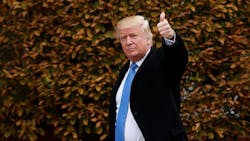The hysteria in the U.S. surrounding Trump’s election has been eclipsed by even more solemn concerns around the world. Nations and their leaders are downright fearful about what America’s 45th president will or will not do. Take, for example, the first foreign leader to visit Trump Tower. It was Japan’s prime minister: who is terrified that America’s seven-decade long commitment to his country’s security might be in jeopardy.
As a global businessperson, Trump is the first president in the history of the republic with so little practical political experience. And, yet, he possesses a highly developed view of international relations. Further, as he says all the time, every situation is a negotiation.
Effectively negotiating means doing many things well. This starts with understanding what strengths and advantages you possess. Trump clearly sees that the U.S. is in a far greater position of strength than most of the American people do. According to Pew Research, nearly half of all Americans believe China or some other nation is the world’s leading economic power. In fact, U.S. GDP is higher than the next three largest economies- China, Japan, and Germany- combined.
On global trade, the U.S. is the principal market in which to sell things. For all the hype about globalization in recent years, access to the American consumer is fundamental to the survival of companies both here and abroad. American consumers account for approximately 18% of all global economic activity. In addition, the biggest single buyer anywhere is Uncle Sam. The U.S. government will spend nearly $1 trillion in the private sector this year. This includes products and services like paperclips, pharmaceuticals, cellular phones, Chevrolets, hotel rooms, the latest MS Word version, airplanes, condoms, and almost anything else you can imagine.
For all the hype about globalization in recent years, access to the American consumer is fundamental to the survival of companies both here and abroad.
—Andrew R. Thomas
Further, U.S. dependence on the global economy is dwindling, principally due to the revolution in shale energy and hydraulic fracturing. While America stills imports energy- and likely always will- the amount of energy imports has fallen by 1/3 in the past decade. In an incredible turnaround, the first U.S. export of liquid natural gas from fracking reached Japan last week. And, while energy exports are likely to increase going forward, the overall amount of U.S economic activity tied to global trade- both imports and exports- will remain around only 20%. In short, the world needs the U.S. market much more than the U.S. needs the world.
Geopolitically, the power of the U.S. is even more extreme. At Bretton Woods in 1944, the U.S. laid out its plan for the post-war world. The vision was as stunning as it was elegantly simple. The unchallenged dominance of the U.S. had most nations assuming the Americans would borrow a page from the playbook of the past: establish overseas colonies and exploit them to sustain a global empire.
Instead, the Americans threw everyone a curveball. In simple terms, the American deal was this: In exchange for willing participation in the global capitalist system, the U.S. would provide three things: a security blanket of protection against your enemies; assured movement of your goods across the world’s oceans; and, open access to the largest single market anywhere: the USA.
It was shocking to the world. Rather than go down the well-worn path of the British, Romans and Carthaginians, the U.S. chose to absorb all of the costs - and assume the bulk of the risks - associated with maintaining global peace and stability. The Allies in 1944, and later the Germans, Japanese, Indians, Chinese, Russians, Uzbeks and everyone else- except the North Koreans- went “all in” to what the Americans were offering.
The results of America’s gambit are clear: Over the past 70 years, more people have lived safer, richer and healthier lives than ever before. Wars between major powers are a distant memory. Extreme poverty –the scourge of human experience- has been reduced by more than 60%- and is still falling!
After the War, nations which in “normal times” would have needed to spend tremendous sums to rebuild their armies and navies, instead were able to invest in improving the lot of their populations: schools, electricity, sanitation systems, and innovation. The American military assured the peace. The American taxpayer paid the bill. Foreign companies and workers benefited immensely selling to American consumers. The U.S. Navy secured the world’s shipping lanes. Products moved seamlessly around the world, unlike any time in the past.
Nations and businesses have built the “American cost savings” into their forecast models. Traditional expenditures on national defense and supply chain security – historically huge costs only digestible to the richest countries and firms – became minor line items. Now it all appears to be changing.
Trump is the first president to brazenly remind companies, nations and their leaders of the tremendous power and reach of the U.S. If he leverages this power in pursuit of “America First”, the world will be inexorably changed in ways we can’t yet imagine.
About the Author
Andrew R. Thomas
Bestselling business author & associate professor of marketing and international business
Andrew R. Thomas' most recent book is The Canal of Panama and Globalization: Growth and Challenges in the 21st Century (2022). He is an associate professor of marketing and international business at the University of Akron.
A successful global entrepreneur, Dr. Thomas was a principal in the first firm to ever export motor vehicles from China. He has traveled to and conducted business in 120 countries on all seven continents.
